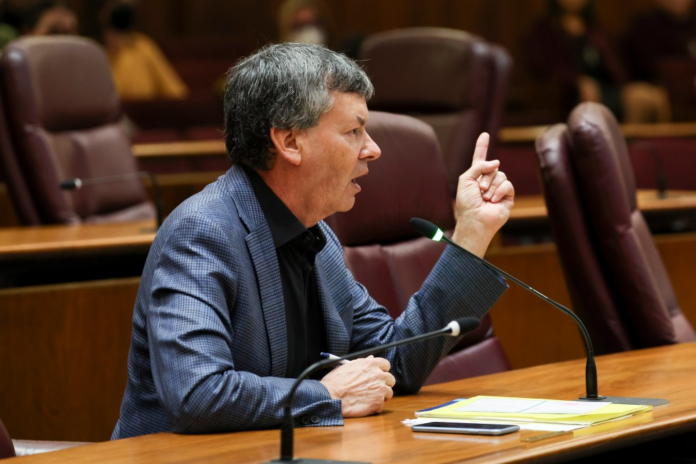Aldermen knocked the simultaneous shutdown of several North Side and downtown bridges Wednesday as they vetted Mayor Brandon Johnson’s infrastructure spending proposals for next year.
The City Council kicked off nearly a month of department-specific budget hearings by grilling Craig Turner, interim Chicago Department of Transportation commissioner. Rather than focusing on the mayor’s proposed 2026 spending, they lobbed an array of ward-level nuts-and-bolts questions: Why is street resurfacing slow? Why aren’t the sidewalks fixed faster? What are you doing to slow down traffic by the school?
And over and over, aldermen representing the Near North Side and downtown asked why so many of their bridges are currently out of commission.
“You’ve created quite a bit of chaos in rush hour,” Ald. Brendan Reilly told Turner. “You guys really need to up your game when it comes to coordinating.”
Three critical and close-together bridges over the Chicago River were closed by CDOT in the last month for years-long renovations: the Lake Street Bridge, estimated shut till January 2028; the Chicago Avenue Bridge, slated to reopen in December 2026; and the Cortland Street Bridge, closed until at least early 2027.
The department has also closed the State Street Bridge for emergency repairs set to end next month.”]
Turner tried to explain the shutdowns to Reilly, a staunch Johnson opponent running to unseat Cook County Board President Toni Preckwinkle, but the downtown alderman shut him down.
“With all due respect, I don’t need a speech. The bottom line here is you didn’t coordinate well,” Reilly said. “You were advised that taking the bridges out of service all at the same time was a bad idea.”
Ald. Walter “Red” Burnett, who represents Fulton Market, told Turner the shutdowns have “constrained my ward.”
“I understand there is a lot of communication issues. It wasn’t created last night, it won’t be solved tonight,” Turner told him. “So I just ask for a little patience to get this working.”
Ald. Scott Waguespack told the Tribune he felt the closures were rushed. And Ald. Timmy Knudsen added he has been fielding angry calls from his Lincoln Park constituents.
“We like to remind them that, you know, we don’t control the bridges in our offices, right? But that is never happily heard,” he said.
Ald. Brian Hopkins claimed the “unprecedented” closures, which he dubbed a “major failure” by the department, were the largest such shutdowns since the Chicago Fire.
“This is one of the most significant impacts you can have on the North Side of Chicago,” Hopkins said. “People are furious because their quality of life has been severely impacted by a negligence of your agency.”
When Ald. Bill Conway asked why the renovations were not staggered, Turner pinned the timeline on infrastructure age and weather. Costs could skyrocket if the city waits, and the money is available to do it now, he added.
“Some things just happen. It’s Chicago. It’s the weather. It’s a lot of different factors,” Turner said. “The more you put it off, the more chances you risk of these bridges failing. And then we have to do an emergency repair.”
For 2026, Johnson wants CDOT to get rid of nearly 100 full-time employee positions to save money.
Turner told aldermen that half the vacant jobs cut in his department’s proposed budget are recent ones only opened since January. The biggest cuts would come to in-house construction, electrical operations, engineering and administration, he said.
As many aldermen complained about the pace of the department’s work on various projects that affect their corner of Chicago, Turner said it is unclear how cuts might change project timelines in the future.
“We’re still digesting to see what these impacts are,” he told Ald. Daniel La Spata. “This is a tough time for everyone.”
“It feels like indigestion, man,” La Spata responded. “If you’re trying to figure out how to digest it, it’s not going down well.”
Turner also told aldermen his department is not currently exploring adding more speed cameras next year. Johnson and aldermen agreed to add more than 50 speed cameras as a key part of their last budget. Supporters billed the move as a safety-focused effort, though the cameras are well on their way to bringing in more than the $11.4 million City Hall projected.


